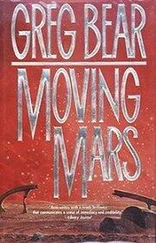In the narrator’s view the future tense doesn’t give facts the necessary grounding. It’s as shapeless as clouds in the sky, and if it brings any order whatsoever it is only an ephemeral and unimportant kind. On the periphery of the landscape the clouds assume new forms, tattered and swirling, and they are illuminated all of a sudden or, on the contrary, darken in shadow. In this way the feathery clouds of summer evenings have been transformed into storm clouds creeping ponderously across a leaden sky on dark bellies that bleed purple from their lacerated sides amid fireworks and the rumble of drum-rolls, in the cascades of a downpour. Water is the only thing they are capable of turning into when floating through the sky eventually becomes impossible: a process as violent as the transformation of future into present. After the repertoire of special effects is exhausted, the storm clouds sail on in the guise of night clouds, black against a black background, invisible. In the end, even if weeks later, they manifest themselves as white billows against a white backdrop, equally invisible, bringing an image of nothingness from which the female owner of the still-conjectured piano turns away with repugnance. The early dusk falls quietly, without the extravagant splendor of the afterglows that, for instance, during the preceding summer flamed over the garden every evening, lighting up the charming little wisps of pink fluff scattered here and there over the horizon — the same material that lends softness to padded furniture and plush toys. The same that eases sorrow, providing warmth and smoothing the merciless hardness of edges. Without which life would not be possible. It hovers high up, light, elusive. In the heavens there is nothing but transient states, nothing that can be taken into possession.
The dry land so longed for, the solid ground of the past tense on which the foot can find support, unfortunately contains much more than necessary. It’s filled with the leftovers of other similar tales, and the fading dreams and desires of figures who are absent and irretrievably lost, mixed with the shallow sand of all the parts of speech. In the darkness of the subsoil the suns of past summer afternoons are extinguished; transitory romances crumble into dust. Eternal love gravitates toward deeper levels of ground, where it grows damp and bereft of luster, like a tarnished wedding band. Along with it molders spurned love. The heavy layers of earth crushing it can be regarded as a metaphor for a memory incapable of forgiveness.
If a spade were to sink into this soil, the blade would make a rasping sound, so riddled is it with the petrified word ‘why,’ a question without an answer, and so filled with shards of shattered and forgotten conditional constructions. How much of this debris could lie in the rectangle of the garden, surrounded by its chain-link fence? No one will take the trouble to count rocks that are of no value whatsoever. It’s hard to say which one comes from which structure and what story it belongs to — this one or another — for unasked questions always take on the same indefinite shape, always the same murky shade of regret. If only they could be dug up and disposed of by the ruthless, tried and tested method of the mercenary corn cartels, whose brokers are constantly monitoring the changing prices in the tables of the commodities markets, and thanks to the amazing new capabilities of wireless telegraphy can manage market swings, in an emergency ordering the crews of steamers to throw burlap sacks of wheat into the ocean without a second thought. The sky in its indifference remains discreet; all around there is nothing but water, impatient and rippling. The voracious sea fish are already waiting, ready to gnaw through the burlap and swallow any amount of grain. But even they will not touch rocks. Meanwhile, in the depths the tireless ocean currents sweep up everything that lies in their path and cast it on land many sea miles, many calendar years away.
And what if one were to begin to fence off the stories, just for the sake of order, so it might be known which one begins and ends where, and who it belongs to? One thing is for certain: The soil inside and out, on our side and on the other, would be equally rocky. Such an operation too would be pointless: For worms and moles a fence is no obstacle, while hobos can vault over it when no one’s watching. Clouds at least, once set loose, float off wherever the wind drives them and don’t come back, which unfortunately cannot be said of the questions buried in the barren sands of stories. The very thought of their monotonous drifting evokes tedium. The narrator cannot see a good way out for himself, since the actual way out — the stylish revolving glass door beneath the gleaming inscription — is not meant for him. The freedom with which hobos jump over fences stirs a longing for open spaces in the narrator. The hobo, who in the meantime has taken shelter from the rain under a torn shopping bag, casts an indifferent glance at the letters over the entrance, which form into a name, let’s say, Universum. Any name is as good as any other, so long as it contains sufficient luster to gild the letters. And indeed, though they can’t be seen from inside the lobby, in this case one can be sure they’re gold. The narrator imagines that if he could, he’d set off without hesitation on the trail of the faded army surplus jacket that is presently growing wetter on the hobo’s back. Where would it lead him by the end of the day? How far to the east, west, north, or south, how deeply into the clefts of the past tense? The hobo stares through the panes of glass at the cigarette butts in the ashtrays; he’d clearly like to light up, but he doesn’t have anything to smoke: The butts from the sidewalk are presently swimming in puddles. In his ear there glitters an earring, a reminder of a better past life and a conventional sign of freedom. Yet freedom has its limits, inflexible as a sheet of glass, though just as invisible. The glass doorway is not meant for the hobo, and so he’ll stare for a while and move on. By chance he is passed by an elderly gentleman, a retiree perhaps, with a small boy. The tramp, always prepared for rejection and accustomed to receiving it without anger, might have accosted him and asked for a cigarette, but he abandons the idea in time. A refusal would have been inevitable, because the boy is wiping tears from his cheeks and wailing in despair. The elderly gentleman is growing impatient. He’s dragging the boy along behind him and carrying an umbrella, and in addition he has to bear his own body. This body, tormented by shortness of breath, sinks under its own weight. From time to time his old rheumatism, a reminder of certain damp trenches, makes itself felt in his knee or his shoulder. The past weighs the most; it fills the body like a boulder. But the body ought not to complain; it is neither hungry nor cold. It’s dressed in good-quality gray woolens, and everything the body might find useful has been placed solicitously in the pockets in advance: disposable paper tissues, a comb, mint pastilles in a small tin. Nevertheless, the body is filled with resentment: It demands the respect owed to age and the weight of the past, and it especially insists on consideration for those immemorial trenches, which here are thoroughly irrelevant. The elderly gentleman in gray woolens believes that the commonplace tale of his long life is here a leading theme of the greatest importance, while in reality this tired body will always be floating on the fringes of the actual story, occupying only episodes. There’s no lack of stories. They’re all over the place; thanks to unlimited supplies, they can be had for a song in any quantity. Yet no one wants them; the narrator also would rather steer clear of them. If in spite of this an episode such as the present one captures his attention, it’s only because of certain additional possibilities concealed within it. If these possibilities are given a say, they’ll inescapably alter the course of all subsequent events, at least to the end of the paragraph. The boy will break away from the elderly gentleman and will run into the roadway, right in front of an approaching van. The vehicle will brake with a squeal of tires. Two men in blue overalls will jump out. One of them carries the photograph of a little girl in his wallet. The girl and the boy are the same age and look very much alike, but for obvious reasons this is hardly the moment to be showing pictures. The elderly gentleman finds no response to the angry gestures of the man in overalls; he merely shakes the boy without mercy. The umbrella trembles in his other hand, while rain drips down their necks. But now this is of no significance to the narrator; the van is already in place — where it was meant to be, expressive and indispensable as a chord closing an overture.
Читать дальше












